
European Colour of Surveillance II – Building solidarity and strategies for liberation
This Blog post was co-written by Salmana Ahmed and Sarah Chander
Earlier this year, across two days in June, 100 racial, social, migrant justice and digital rights organisers came together in Berlin for the second European Colour of Surveillance conference. The event, hosted by Equinox, International Women* Space and Weaving Liberation was all about building connections, sharing challenges and strategies, and identifying what is needed to advance collective and coordinated challenges to racialised criminalisation and surveillance. This blog gives an insight into the two days of community building, collective action and celebrations!
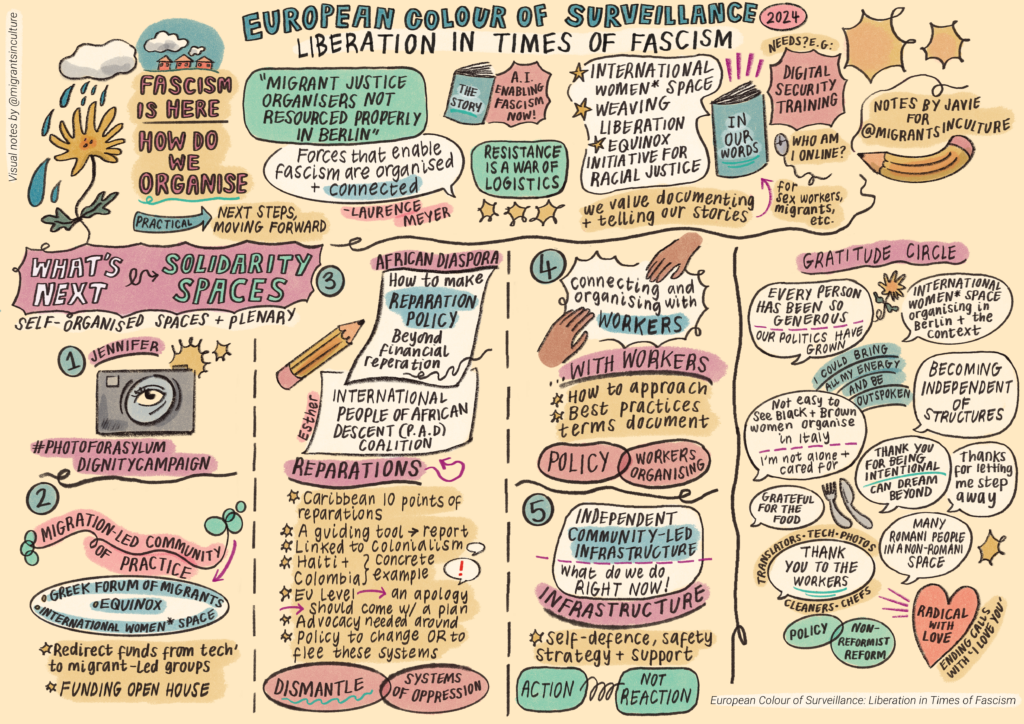
Credit: Visual notes by Javie Huxley for Migrants In Culture
Meeting the moment: liberation in times of fascism
This year’s European Colour of Surveillance follows on from the first conference in 2022, inspired by the work developed by the Center of Privacy and Technology at the University of Georgetown (which is back this year!). The aim of this conference has always been to create a space that centres the visions, priorities, and practices of activists and organisations working at the intersection of racial, social and economic justice and technology – space that currently remains severely lacking in Europe. It is designed to give people the time, infrastructure and community to build deepen collaborative efforts to organise around their most critical priorities.
The theme of the conference this year was– ‘Liberation Practices in Times of Fascism’ with a focus on migrant-justice organising and building resistance practices. The event took place two weeks after the European elections gave a terrifying and resounding boost to far-right political groups and ideologies, a week before a huge rise in far-right vote share in French legislative elections (although still losing, a major win for organisers on the ground!), and in Berlin, in a context where racialised criminalisation and surveillance has increased in intensity over the past few months.
These shifts have been in motion for a very long time, and have been particularly present for groups working at the intersection of racial justice, migrant justice, and tech justice. In fact, it was a conversation between Sarah Chander, Jennifer Kamau and Laurence Meyer on the sidelines of a Palestine solidarity protest in Berlin last year that cemented the need for the next conference to focus on this theme.
The question became, how can Equinox, International Women* Space and Weaving Liberation design this space to meet the current needs of racial, social and digital justice organisers??
How to design a space for organising?
We had several considerations at the forefront of our minds whilst planning this event:
Centering community-led organising: the goal of the event was to bring together organisers working at the intersection of migrant justice, racialised surveillance, and tech justice. We were intentional about centering community organisers whose visions, practices and priorities are often marginalised in the broader ecosystem. We prioritised organisers on migrant and racial justice, sex workers’ rights, Black feminists, anti-Muslim racism,queer and trans issues, tech worker organising, Roma and Sinti rights, artists, technologists etc.. We wanted people to feel like they were in a community where they were seen and understood and could strengthen their organising practices. As one participant shared ‘this is the first time at an event I have not been the only person from my community but have been amongst four or five people, which is really important to me’.
Resistance practices and self-organised spaces: It was important to us that the agenda met the needs of the people we were inviting into the space, and as such we left most of the agenda open for people to propose sessions that fit the needs of their activism and community realities. In particular, we asked people to focus on resistance practices. So at conferences we find ourselves re-explaining the problem – we wanted to make space for meaningful discussions on how we would collectively organise, as opposed to continuously analysing new and old ways oppressive structures operate. We designed the space with the goal of moving us toward action, encouraging participants to work in solidarity with each other and for opportunities for collective work to emerge. The panels, workshops and the agenda overall were anchored in questions that included: How do we get practical about next steps? What do you need to move your work forward? What can you offer others that might help advance their work? How can this community of people help each other?
Building capacity around the question of technology: the current ecosystem remains fractured and racial, social and economic justice groups don’t have access to the resources and networks they need to organise at the intersection of technology and justice. A primary function of this conference was to help bridge the gaps between groups and ensure understandings of the role of technology were central to discussions, without being overly technical and over-emphasising the technological aspect. Digital harms are always products of broader social, political, economic justice issues. The panel discussions were used to set the scene, bringing in a technological perspective to discussions around organising for migrant justice, racialised surveillance, infrastructures of repression and community resistance. The workshops were also developed with consideration of the role that technology has played across several themes proposed for discussion. There was also support on offer for those with technical / digital security and safety questions, from Digital Defenders Partnership, who hosted a full-day clinic and practical workshop to build the understanding and capacity of groups at the event.
Spaciousness, celebrations, and creativity: the issues groups are working on are extremely heavy and consuming, and in an increasingly hostile political climate with severe underfunding, it is no surprise that people do not have capacity to prioritise moments of joy and relaxation. So, we wanted to make sure people had space to relax, spend time in community and find ways to engage in creative activities. We tried our best to design the agenda spaciously and had dedicated spaces for people to pray and or rest in a quiet room. In addition, we planned time for a community celebration in the form of a ‘Sip and Paint’ party, so people could unwind at the end of the first day. We designed F*** the Digital Police T-shirts that people could buy across the two days, and use for the t-shirt painting party, with all proceeds going to support the brilliant and critical work of International Women* Space.
With the weather looking promising, 100 people confirmed to attend, and an agenda shaped by two context-setting panels, 12 workshops, open space for self-organised sessions and a party… how did the conference shape up?
Day one: rooting in the local context, collective conversations, and celebrations!
We kicked off the first day with a powerful discussion moderated by Laurence Meyer on Organising for migration justice in Germany under digital surveillance. Jennifer Kamau, from International Women* Space, Sanchita Basu, from ReachOut Counselling Centre, Olivia Green, a sex worker rights’ activist, and Yonathan Miller, from Berlin Tech Workers’ Coalition shared the evolution of their organising work and practices, helping us to understand how resistance work happens and that it is not by any means a linear journey. We heard important context on digital censorship, surveillance and criminalisation practices against various communities in Germany, in particular in an increasingly hostile political climate, with far-right rhetoric and politics on the rise. The panel ended with an identification of what is needed for migrant justice organising to continue, with a big emphasis on mobilising resources to support core, operational work – an idea that people then worked on throughout the rest of the conference.
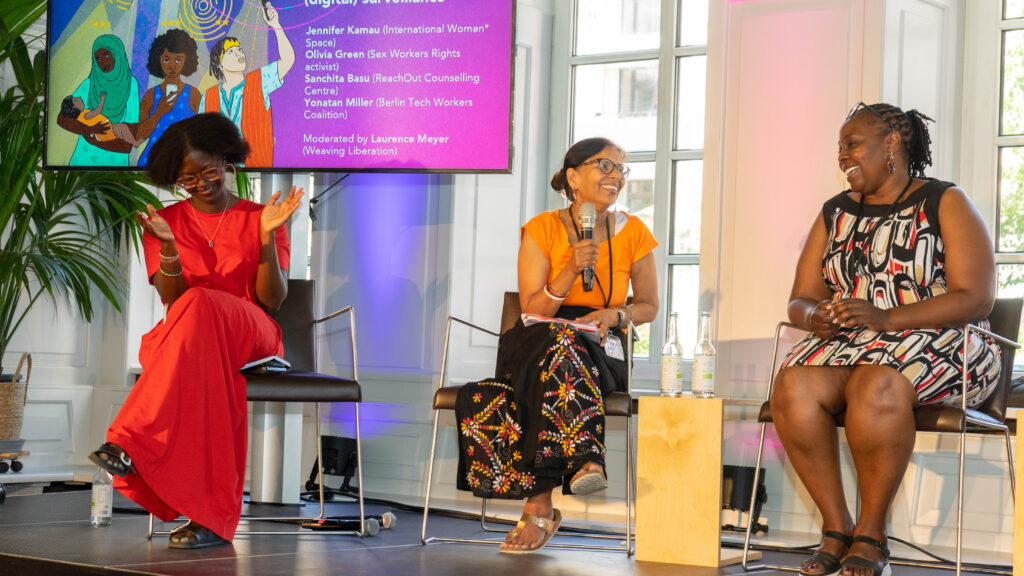
Pictured: Laurence Meyer (Weaving Liberation); Sanchita Basu (ReachOut Berlin); Jennifer Kamau (International Women* Space). Credit: Antoinette N’Sow
We then dived into two rounds of community-centred workshops, covering a number of varied resistance and organising strategies. Here’s a short summary of the workshops:
–Anti-Muslim surveillance and resistance strategies, where it very quickly became clear how experiences of surveillance were very much shared by communities in Germany, the UK, Netherlands, and Italy opening-up opportunities to learn from each other’s strategies and tactics.
– Romani Surveillance and Biometric Data Collections, where the long history of criminalisation of Romani and Sinti populations was used as the basis to explore their continued experience of surveillance today, enabled by technology. The conversation helped identify what kinds of knowledge was missing to help inform resistance work and connections to other communities that need to be made to ensure the movement is built on strong intersectional solidarity.
– Digital security for everyone, where participants deepened their knowledge on digital security and self defence practices specifically for racialised, migrant and other marginalised communities. Best practices and resources were shared on how best to protect ourselves activists, on issues like digital communications practices, encryption and how to protect oneself online.
– Understanding and Resisting Surveillance in EU Migration Policy: where we analysed how EU migration policies are implementing a dangerous regime of digital surveillance. We highlighted a need for connected work at a policy level with coalitions like Protect Not Surveil, but also to build power amongst grassroots, migrant-led organisations.
A long lunch break under the sun was followed by a second round of workshops which included conversations on:
– Free software tooling for undocumented migrants, where we explored a variety of different, non Big-Tech owned tools that could be used for organising, including the idea of developing new community-owned servers.
– Digital rights and resistance strategies from sex workers, where we discussed surveillance challenges faced by sex workers including algorithmic policing, shadow-banning and other discriminatory applications of terms and conditions. People in the workshop also shared strategies they have used, including legal action and digital safety tools, to address these kinds of challenges.
– Resisting colonial tech tools in Italy, where there was an exploration of the lesser-known aspects of Italian history regarding colonisation and indigenous resistance movements. We mapped this only recent development of racialised surveillance in Italy, including the use of predictive policing, facial recognition and racial profiling and criminalisation of Black and brown people and migrants.
– Resisting Dehumanisation through Photography in an Asylum Center, where we discussed a concrete case of racist abuse as part of the immigration detention centre complex, and specifically how this group of activists can come together to mount a campaign for dignity and police accountability.
We moved into party mode, starting with a presentation of the amazing work of the International Women* Space, migrant-led, feminist, anti-racist political group in Berlin. IW*S talked us through their blueprint for political organising – giving participants an insight into the different tactics they use to address challenges faced by migrant and refugee women*. You can read more about their critical work here.
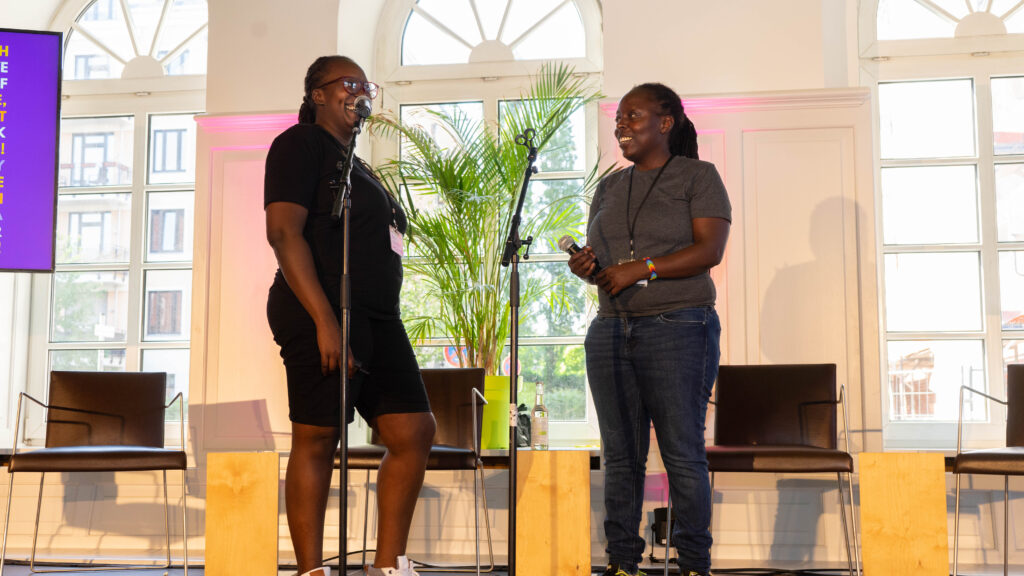
Pictured: Jacky & Rose (International Women* Space). Credit: Antoinette N’Sow.
After the presentation, the only thing left to do was to ‘Sip and Paint!’. We had a surprise birthday celebration for two members of the community – Jennifer Kamau and Patrick Williams – and we carried those celebrations into the evenings activities where we all had the opportunity to hang out and paint t-shirts using resistance dye techniques, led by the brilliant Alice Z Jones. No party is complete without music, and that was provided by the incredible DJ and Romani feminist activist DJ Aldessa.
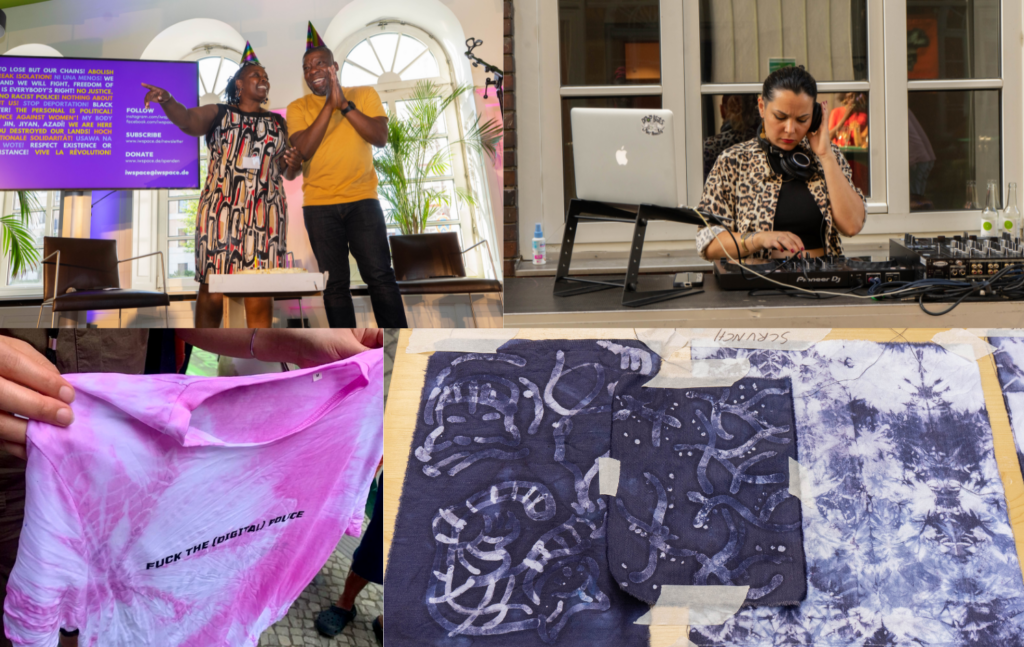
Day two: going global, continued conversations, and next steps
The party was a hit, and we know this because day two started slowly…, but start it did, with the final panel ‘Digital Infrastructures of oppression – international and community resistance’. The panel was moderated by Equinox’s Sarah Chander with Sara Chitseko from Erase the Database, Marwa Fatafta from Access Now and Adla Shashati from the Greek Forum of Migrants, exploring the international context for of digital oppression and criminalisation in Greece, Palestine and the UK, and the need for global solidarity and sharing strategies of resistance. We learned of racial capitalism’s connections between digital policing, censorship and the provision of surveillance systems globally, as well as concrete strategies for connecting struggles. This panel was live streamed and you can watch the recording here.
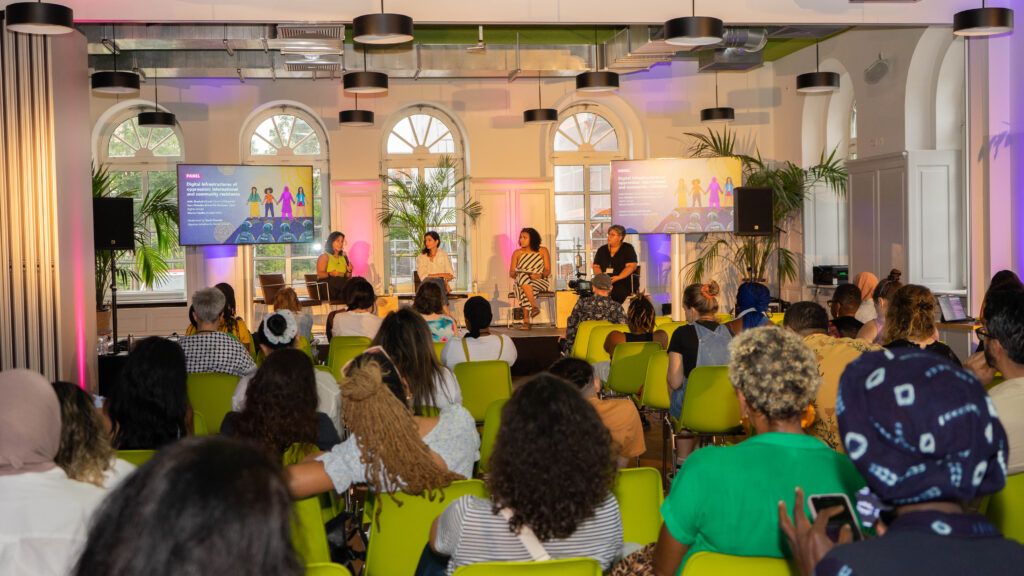
Pictured: Sarah Chander (Equinox Initiative for Racial Justice), Marwa Fatafta (Access Now), Sara Chitseko, (Open Rights Group, Erase the Database), Adla Shashati (Greek Forum of Migrants). Credit: Antoinette N’Sow.
The panel was followed by the final set of workshops, which included conversations on:
– Bridging corporate and state surveillance, where we explored different strategies within tech worker organising, across different companies and geographic contexts.
– Resourcing migrant-led organising, where we talked about concrete difficulties faced by migrant-led organisations to resource their work, specifically for organisations who engage in both direct community support and political organising. We decided to build power amongst racialised and migrant-led organisations in Europe, developing a community of practice to map and understand the needs of migrant-led advocacy efforts across Europe,but also legal and financial and general operational support.
– The Colour of Surveillance in Greece: Lessons from challenging migration tech, where the conversation explored the use of tech at Greek borders and how to address the immediate harms (e.g. use of surveillance tech) vs. the systemic challenges posed by a racist and violent political and social context. We explored the recent case study challenging the Greek Ministry of Migration’s use of AI in migration via data protection law, and the opportunities and flaws of this approach.
– AI-aided state repression in response to Eritrean refugee resistance, where we discussed transnational connections between AI based harms stemming from the Eritrean dictatorship and the repression of Eritrean refugees in Germany, as well as the surveillance of other political activists. We explored how to best build solidarity in these contexts, in particular in the context of social media activism dominated by Big Tech.
The conversations across the two days had generated a lot of momentum and opportunities for further collaborative work, and we wanted to create time at the end of the conference to allow people to pick up threads from the past two days and spend time together understanding what they needed or could offer to advance the work beyond the conference. The next steps and solidarity sessions saw several groups get together to discuss what they wanted to see happen next.
We were so happy to see needs, solutions, organising strategies expressed, as well as some concrete plans for participants to get together to organise beyond the conference. As next steps, we highlighted the need for work on using reparatory justice frameworks for policy work, build a community of practice around resourcing migrant-led organising, link broader anti-surveillance policy work with tech worker organising and ways to develop community defence and security strategies.
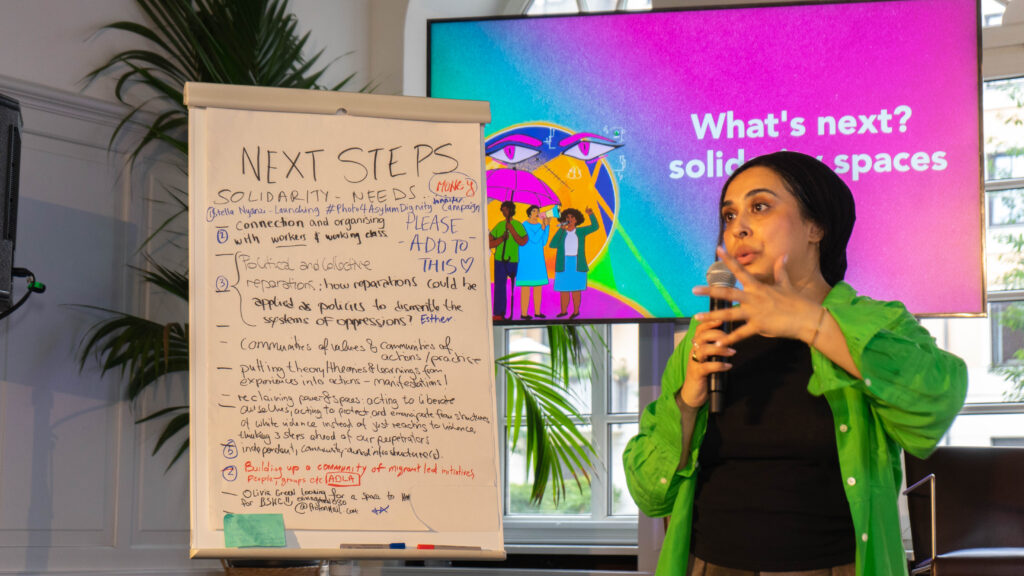
Pictured: Salmana Ahmed (Weaving Liberation). Credit: Antoinette N’Sow.
As we closed out the conference, we heard from several people how important the conference had been in lifting spirits, building solidarity, creating opportunities to make connections that will bolster their work, and learning a lot from each other about shared struggles, resistance strategies and visions for more liberatory futures.
A key takeaway was the need for more organising spaces (such as Weaving Liberation’s Digital Liberation Retreat), more resources to migrant-led organisations (such as the International Women* Space) and more concrete ways to build power amongst racial and migrant justice organisers (including the community of practice led by Equinox, the Greek Forum of Migrants, and IW*S).
We are so grateful to all the participants who attended the conference and shared their time, brilliance and warmth with each other. The conference was a result of the tremendous effort put in by all the people present, with a special thanks to the panellists and workshop leads for informing such a rich agenda and leading such energising and generative discussions.
We also want to take the opportunity to show our gratitude to all the providers who helped being the second European Colour of Surveillance to life: Migrants in Culture for the visual archives, Digital Defenders Partnership for the digital self-defence helpdesk, Alice Z. Jones for the F*** the Digital Police T-shirt workshop, DJ Aldessa for the music, Antoinette N’Sow for the photography, and to the workers who sustained us and cared for us throughout the event. International Women* Space relies on different forms of support and funding but “no strings attached” financial donations are very important. Please support by donating to International Women* Space using this link.
